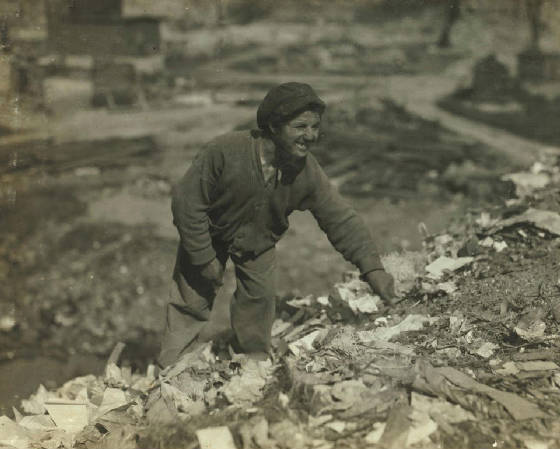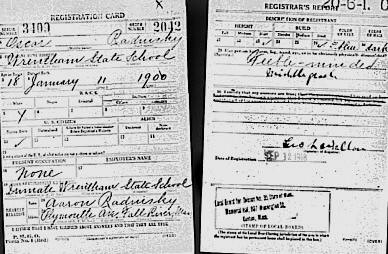
Lewis Hine caption: Oscar Revinsky(?) – Born Jan. 11, 1900, 15 years old – 99 Oak Grove Ave. A scavenger on Pine St. Dump. Case known to S.P.C.C. (record No. 4322) since 1910. In 1913 parents refused to let child be committed to Wrentham, Mass. In 1916 father came to office asking that boy be committed as he spent all his time on the dumps. Deficient mentality. Neck covered with scars and boils. “No work – no school” since 1912. Never cleans up. Doesn’t go home to meals. Eats from dump and steals from dinner pails. Hard for him to tell where he lives. Thought 92 Oak Grove Ave. Was in baby grade at Ruggles School and was expelled. “Is father alive?” “No, he’s a milkman.” Fall River, Mass. 6/22/16. Location: Fall River, Massachusetts.
On this visit to Fall River, Hine spent a great deal of time photographing children in many situations, not just child labor. He was documenting various aspects of life in what was one of the country’s most important centers of the textile industry. Still, this is one of Lewis Hine’s strangest photos. My presumption is that Hine, who was a social activist and sympathetic to the Progressive movement, must have been concerned that no one in the community had done anything to help this boy, apparently not even his parents, who at first rejected his commitment to the Wrentham State School. That’s the facility that the caption is referring to when it says “committed to Wrentham, Mass.” The school opened in 1906. Perhaps the conditions in the hospital were very poor, or at least perceived to be poor. The boy would have been highly visible at the dump, and the school would have known of his condition. This is a good example of the way society dealt with, or didn’t deal with, mental health problems and retardation at the time, and Hine would likely have been acutely aware of it.

According to the book, The Jews of Rhode Island, edited by George M. Goodwin and Ellen Smith, a sizeable group of Eastern European Jewish immigrants settled in Bristol, Rhode Island, in the late 1800s. In the 1900 census, the Radnisky family was among them. Aaron and Ethel Radnisky (listed as Ann and Mary Radinskey) and six children lived in Bristol, where Aaron worked for the National India Rubber Company, which made shoes and boots. The two oldest children were born in Russia, the next three in New York, and one-year-old William was born in Connecticut.
Aaron came to the US in 1888, and Ethel followed her husband over in 1891, both of them likely coming through Ellis Island. They moved to Connecticut between 1897 and 1899, then moved to Bristol. Oscar was born on January 11, 1900 (draft registration), but he was not counted in the 1900 census taken in June of that year, so perhaps he was born in 1901.
In the 1910 census, Oscar was living in Fall River, Mass. with a younger brother and sister and four older siblings. Father Aaron was employed as a milkman. Oscar finally got into Wrentham State School, his address on the 1918 draft registration. His “physical” description is noted as “feeble minded.”
In the 1920 census, he is still at Wrentham State School. And in the 1930 census, he is at Taunton State Hospital in Taunton, Mass. According to the Social Security Death Index, he died September 15, 1971, in Taunton. The Massachusetts death records give the date as September 24.
Various records show different spellings of the surname, although Oscar’s draft registration and death records all list Radnisky. I could find no further records of Oscar’s parents and siblings after 1910. There are no listings for anyone named Radnisky on Ancestry.com, except Oscar, and no Radniskys currently listed in the Internet white pages.
I requested Oscar’s obituary from the Taunton Library, but there wasn’t one in the local paper. What kind of life did he have? Where did his family go? Were any of them present when Oscar passed on? Is there anyone who remembers him?
See links below for information about Taunton State Hospital.
*Story published in 2008.